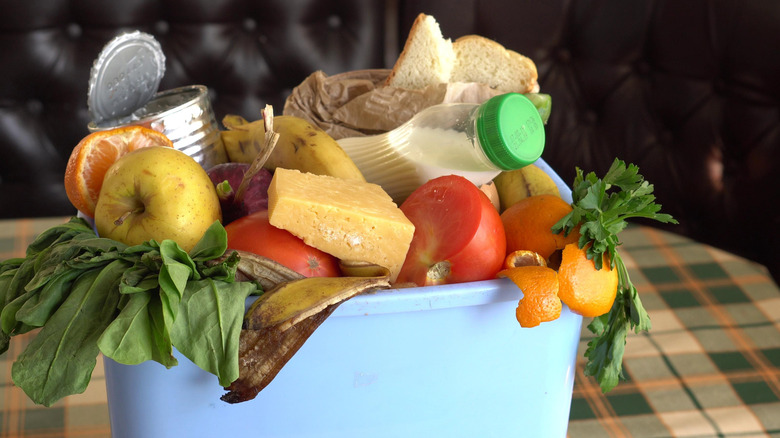New Survey Reveals Grocery Stores Are Struggling With Food Waste
Have you ever wondered what grocery stores do with all the perishable products they can't sell? It turns out, many of those stores don't have a great answer to that question. According to a new survey reported by Grocery Dive, while 90% of grocery retailers say that reducing food waste is an important issue for them, over 50% say they lack the technology and support from management to effectively deal with it.
According to The Guardian, a UN report in 2021 estimated that almost one billion tons of food are wasted around the world each year, even as people went hungry and the world faced an impending food shortage due to factors including climate change and the War in Ukraine. Additionally, UN research suggested that 10% of the emissions creating climate change could be linked to the production of wasted food, which was even more than those created by all individual countries except the U.S. and China (per The Guardian).
While grocery stores in North America agree this is an issue they need to invest more resources in combating, they are somewhat split on how to do this. As Grocery Dive notes, different stores seem to have differing definitions of "food waste" with some counting only food that is sent to landfills, while others consider wasted food anything that is left unsold, even if it ends up being diverted for use in food banks or animal feed.
Recycling food
According to Grocery Dive between 25% and 40% of all food grown and processed in the U.S. is thrown away. Kroeger, the fourth largest grocery retailer in the U.S. (per Scrape Hero), is attempting to better understand food waste as part of its commitment to improving sustainability. In 2021 the company launched a grant initiative for researchers to study consumer-level food waste in an effort to improve data that stores could use to make more efficient purchasing decisions and better divert their unsold food.
In addition to donating food to food pantries, which are struggling under increasing inflation, The Guardian notes that countries like Italy, France, and Spain have recently taken measures to require restaurants and grocery stores to use un-donatable food like overripe fruit for the production of animal feed, juices, jams, or fertilizers. Another possible avenue to reduce food waste is biofuel. Electrek recently reported that an ongoing study at Purdue University is working on a process of clean energy production using hydrogen from food waste.
While commercial food waste may be easier to curb with donations and corporate planning, consumer waste created by poor planning or small leftover portions will always exist, though some groups are working on that as well. This summer the Beacon Hill Times reports that Boston is piloting a community composting program for apartment buildings which would create nutrient-rich soil by putting out special dumpsters used exclusively for compostable food waste.

